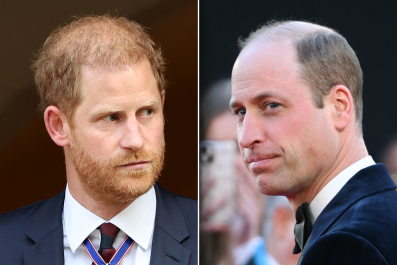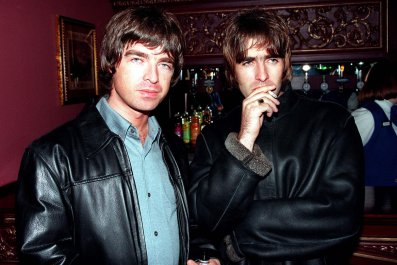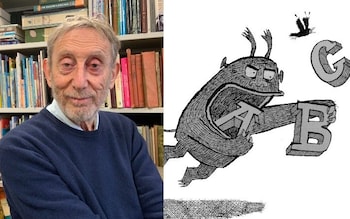At first, the word "joy" seems incongruous when mentioned in the same sentence as Nick Cave and the Bad Seeds. For a good part of his career (now going on 40 years) as the band's singer and namesake leader, Cave famously inhabited the persona of a dark, intimidating and tortured artist whose turbulent lyrics tackled topics such as religion, relationships and mortality. For instance, on "The Mercy Seat," one of his most famous songs, Cave sings from the point of view of a prisoner on death row: "And my body is on fire/And God is never far away." His distinctive baritone singing further enhanced his reputation as an intense performer with a worldview that lies somewhere between heaven and hell.
But in the last 10 years, the Australian artist's perspective has matured along with the Bad Seeds' sound, especially amid tragic circumstances in his personal life: in 2015, Arthur Cave, one of the singer's twin sons, died at age 15 after he fell from a cliff in England. Then seven years later, Cave announced in a statement that his eldest son Jethro Lazenby, 31, had passed away. The Bad Seeds' last two albums, Skeleton Tree (2016) and Ghosteen (2019), along with 2022's Faith, Hope and Carnage, a book Cave co-authored with Seán O'Hagan, were released during that period of introspection.
This time around, however, the Bad Seeds' new studio album, Wild God (August 30) reflects a more uplifting and hopeful outlook. As the affable Cave, 66, tells Newsweek during a recent visit to New York City, Wild God signals the end of a particular chapter in his life. "This one feels like we brought the Bad Seeds back," he says. "It was a sort of explosion of activity and life. It's joyous. There's a song [on the new record] called 'Joy.' I do have a particular understanding of what that word actually means, and it's a deeper word than it appears to be."
This is from an artist whose previous reputation for chaos dates back to his late '70s/early '80s pre-Bad Seeds group, the Birthday Party. "I think joy on some level is a form of suffering, you could say," Cave continues. "It's a sort of upward explosion with the knowledge of what we are as human beings. This record's like that. It keeps bursting forth."
Cave says that the mostly exuberant sound of Wild God, which combines rock and electronic-influenced textures, wasn't intended to be a deliberate reaction to the reflective and spare-sounding Skeleton Tree and Ghosteen. What he wanted from the outset was for the members of the Bad Seeds—multi-instrumentalist Warren Ellis, bassist Martyn P. Casey, percussionist/drummer Jim Sclavunos, guitarist George Vjestica and drummer Thomas Wydler—to be featured more prominently in the music after the last two group albums.
"I'm just sort of led along by what comes lyrically," Cave explains. "I don't really have much control over that. But I did want the Bad Seeds to be involved as a band. Finally, they had a record [via Wild God] that they could come and actually play on. And so they put their hearts into it."
Meditations on faith, spirituality and rebirth run through Wild God's luminous songs such as "Song of the Lake," "Final Rescue Attempt" and "As the Waters Cover the Sea." In a previous interview with MOJO, Cave said the new tracks thematically represent "a series of conversions." "I'm not necessarily meaning religious conversion," he elaborates to Newsweek, "but there are obviously heavy religious overtones to the record. A kind of changing from one form to another form — to begin one way and arrive at somewhere different."
Among examples of that sense of conversion from Wild God are the cinematic title song and the country-folkish "Long Dark Night," two poetic tracks that share a common lyric about a flying man with "long trailing hair." The singer says: "It's a character or force or whatever that's moving through the world—searching for someone to believe. Not something to believe in, but searching for someone to believe in him. There's a difference. And they are linked, those two songs."
The dreamy-sounding track "Frogs," one of the first singles released ahead of the album, is also an example of the joy and resiliency that characterizes the overall tone of the new record. It begins with a reference to the biblical story of Cain and Abel and closes with a nod to Kris Kristofferson's "Sunday Mornin' Comin' Down."
"We have this song bookended by two forms of spiritual desolation," Cave says of "Frogs." "And within the song itself, it's these moments of spiritual exhilaration personified in the frog itself. To me, the frog has always been this joyful little creature that sort of sits in his s*** and then occasionally leaps up and comes back down again. And that happens throughout the song."
Perhaps the most touching track of many on Wild God is "O Wow O Wow (How Wonderful She Is)," which is dedicated to musician Anita Lane, an early member of the Bad Seeds and Cave's former romantic partner, who died in 2021 at age 61. Her actual voice is poignantly featured in the song via a phone conversation with Cave taped about two years before her death.
"When the music scene in Melbourne was starting up [in the late 1970s], it was a bit like the punk rock scene anywhere else," Cave recalls. "A lot of people came out of the art schools. Anita rose out of that, this bright, sparkling, beautiful, happy, laughing creature that we all circled around." That was Anita. Everyone was sitting in the studio, tears running down their faces [upon hearing "O Wow"]. It's a beautiful moment. Everyone loved her very much."
The Secret to Longevity
Cave attributes the new record's vibrant sound to the mixing work of American music producer Dave Fridmann, whose credits include the Flaming Lips and MGMT. Dissatisfied with their initial rough mix of the album, Cave and longtime collaborator Ellis brought the new music to Fridmann's studio in Buffalo, New York. What the two first encountered in working with Fridmann surprised them.
"[Dave] goes away into his studio and locks the door, and we're like, 'Hang on. No one does that to us,'" the singer recalls. "We're always involved in everything. But he's like, 'Just wait there. I'll be out with something for you to listen to.' Then when we heard the stuff, it was like, 'What? This doesn't sound anything like the record that we handed in.' Then we played it a second time...and the third time I was like, 'Wow, this sorted out all the problems that we had and turned the elegance of the Bad Seeds into just pure emotion.
In a fitting full-circle moment, Wild God's arrival coincides with the 40th anniversary of the Bad Seeds' debut album, From Her to Eternity, recorded and released after the dissolution of the Birthday Party. "No, I didn't think in those terms anyway," he says about the band's longevity. "There was something I did for Australian TV and they had a snippet of an interview of me from 35 years ago going, 'One thing I know is that I won't be doing this s*** when I'm old.' A completely sort of disparaging view of music that I had back in those days. But here I am."
While Cave remains the driving force of the Bads Seeds (as well as the sole member of the original lineup), he acknowledges that the band's staying power and success have to do with the many past and present members who entered Cave's orbit—among them Mick Harvey, Blixa Bargeld, Barry Adamson, Hugo Race and Kid Congo Powers.
"I try and give credit where credit's due, and I take great pride in being a collaborator," says Cave. "There's nothing more joyful than being in a room with musicians making and playing music—and nothing more dispiriting than sitting there on your own writing lyrics. I know about both of those things [chuckles].... It's the suffering element of creation. Once I've got those words, I go into the studio with the Bad Seeds and it's all joy."
The band's willingness to explore new sonic territory since their post-punk beginnings also explains their longevity. "The reason why we can continue," Cave adds, "is because we take an attitude of creating new music—different sorts of music—and [be] unafraid of that. So we don't allow the direction of travel to be dictated by the fans. I love my fans. But they don't get to say what our music is like. And the fans that I really love are the ones who understand and cherish the fact that we make music that they may not like."
Connecting With Fans
Cave's display of empathy in recent years through music and press interviews also found its way via his interactions with the public. In 2018, three years after the death of his son Arthur, he launched The Red Hand Files, an online newsletter where fans submit questions about almost anything. The forum publishes those questions accompanied by Cave's responses.
"I have this relationship with my audience where I'm answering questions that I have absolutely no authority to be answering," Cave says. "I'm not unaware of how completely ridiculous the whole thing is on some level. But at the same time, it works...And I kind of grew into the role.
"The perverse part of it is that I'm not an empath," he continues. "To answer these questions compassionately, I have to really walk at a long distance to the better end of my nature. Mostly in my mind, I'm like, 'For God's sake, get over it.' Then I think, 'Is that a responsible way to answer this person's question? If I say this and this, this might even make them feel a bit better.' I think it serves a purpose and is genuinely helpful to people.... It's helped me become a bit of a better person."
Meanwhile, the songs from Wild God appear destined to go down well at the Bad Seeds' future live shows, which have previously provided compelling moments. Cave has been known to go into the crowd and touch a spectator's hand. It's a form of connection with his fans.
"The way I perform on stage is mostly nerves, and I don't know what to do with my hands," he says. "I think maybe if I just keep moving, people won't realize I'm singing flat. [chuckles] But in the end, it's difficult to exaggerate the feeling of walking onto the stage into this sort of vortex of people's concern and love. I don't take that lightly at all. I take music seriously in the sense that it is a legitimate opportunity—maybe one of the last legitimate opportunities—to have a sort of transcendent experience."
Cave has always been a fount of activity. In addition to making music and touring with the Bad Seeds, he's been involved in other creative endeavors from scoring movies with Ellis to writing books to creating ceramic art. But his attitudes about work and personal relationships have shifted. In a recent Australian Story interview, Cave said he was once "in awe of my own genius" before Arthur's death; now he looks back on that as "self-indulgence." As exemplified in Wild God, his current outlook on life is another sign of him moving forward.
"It's about attention to things," he tells Newsweek. "I always thought if the work is OK, everything else is fine. I don't have to worry. And on some level, relationships outside of work—as much as I love the people, nothing got in the way of the work. I regret that.
"I think it's important to try and work out what we are in the world," he continues. "You're a son, you're a father, you're a citizen of the world...and it's worth paying attention to each of those things. How best can you be a husband, let's say? It's worth thinking about, rather than just how great an artist you can be, and letting the rest sort itself out."
FURTHER LISTENING
In the last 40 years, the acclaimed music of Nick Cave and the Bad Seeds gradually evolved from the jagged post-punk/blues influences of their earlier albums to the subdued electronic-influenced soundscapes of the band's most recent works. Here, in his own words, Cave cites some of the Bad Seeds albums that were turning points in the band's history.
From Her to Eternity (Mute, 1984)
From Her to Eternity is extremely important because that brought in the whole idea that was taken from a couple of songs that the Birthday Party did, like "King Ink"—linear bass lines with a whole lot of words stacked on top. That was a way in which a lot of our music evolved, and you can see that throughout. This record set a basic template of how the Bad Seeds write songs.
The Boatman's Call (Mute, 1997)
I think [the earlier albums before The Boatman's Call] have a certain style of lyric and concern, which is basically third-person narrative songs. They're essentially character-driven. This record comes along, which tears that idea down. This is a deeply personal record about myself. If you're looking at it in poetic terms, it's in the confessional style of poetry. I'm just writing about what's going on in my life.
Dig, Lazarus Dig!!! (Mute, 2008)
This is an important record, even though it's a record I don't particularly like. I mean, it's got a lot going for it. But it's the last, in my view, guitar-based rock record that we made. Because after that record, [Bad Seeds co-founder] Mick Harvey left and he took his f****** guitar with him. So these records [like Skeleton Tree and Ghosteen] aren't guitar records. Wild God may be like a rock record, but it still doesn't have a lot of guitar in it.
Request Reprint & Licensing Submit Correction View Editorial GuidelinesAbout the writer
David ChiuDisclaimer: The copyright of this article belongs to the original author. Reposting this article is solely for the purpose of information dissemination and does not constitute any investment advice. If there is any infringement, please contact us immediately. We will make corrections or deletions as necessary. Thank you.




